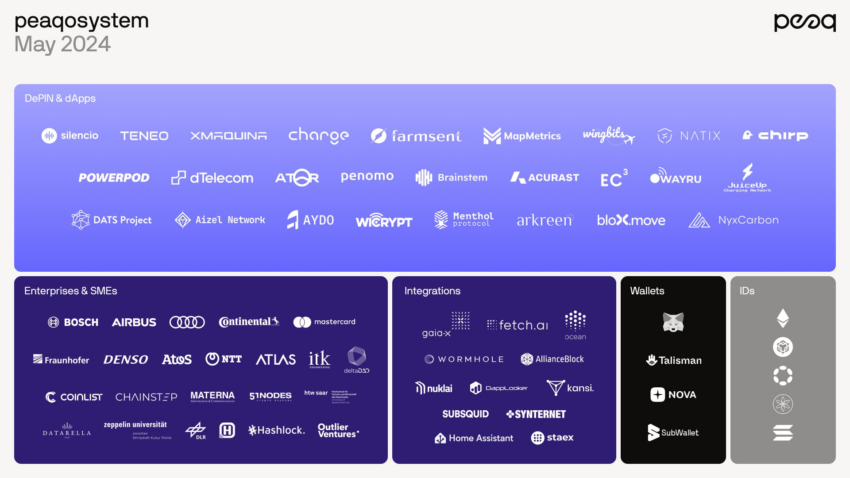Decentralized physical infrastructure networks (DePin) are transforming technology by enabling decentralized projects in real infrastructure.
Here’s what happened recently in the DePin sector: Minima launched the world’s first on-chain race data logger for the McLaren GT4 supercar, SEALCOIN introduced a new IoT platform backed by strategic investments from The Hashgraph Association, Particle Network closed joins Peaq Ecosystem.
Minima introduces blockchain-powered data logger for McLaren GT4
Minima has successfully powered the world’s first on-chain race data logger for the McLaren GT4 supercar. This technology debuted at the renowned Spa-Francorchamps circuit and represented a huge advance in motorsport data management.
The data logger, developed by Influx Technology, uses Minima’s L1 blockchain. This guarantees the immutability and transparency of critical racing data. More than twenty parameters, such as ignition timing, braking and engine temperature, are recorded in real time. This system provides teams with reliable, immutable data, improving decision-making and compliance.
“We believe that the full potential of blockchain has yet to be realized. To achieve mainstream adoption, it must provide practicality and seamless integration. We’re working with Influx to solve a real challenge facing the automotive industry. This partnership sets a new standard in race data logging, combining cutting-edge blockchain technology with the prestige and precision of McLaren’s racing heritage in their GT4 supercar,” said Hugo Feiler, co-founder and CEO of Minima.
Read more: What is DePIN (Decentralized Physical Infrastructure Networks)?
Minima’s blockchain integration addresses long-standing industry challenges by ensuring data integrity and security. This development is a huge step towards optimizing performance and maintaining compliance within the competitive motorsport environment.
SEALCOIN Launches Blockchain-based IoT Platform with Hashgraph Support
SEALSQ Corp has launched SEALCOIN AG, a new entity focused on DePIN. Backed by strategic investments from The Hashgraph Association, SEALCOIN addresses the growing need for efficient, reliable transactions in the IoT sector, especially in Transactional IoT (t-IoT).
Using Hedera’s decentralized ledger, smart contract service, token service and consensus service, SEALCOIN creates a DePin infrastructure. This allows IoT devices to independently handle transactions without human intervention or unnecessary intermediaries, improving the efficiency, security and reliability of IoT interactions.
“We at The Hashgraph Association believe that DePIN solutions are positioned to revolutionize the connected economy, delivering trust, efficiency and innovation to businesses and users based on Hedera’s distributed ledger technology. We are excited to support SEALCOIN AG in bringing DEPIN Transactional IoT forward in a scalable, secure and transparent manner,” said Kamal Youssefi, President of The Hashgraph Association.
Read more: Top 12 crypto companies to watch in 2024
The SEALCOIN utility token facilitates the exchange of services for a fee, ensuring efficient and reliable data management. This collaboration highlights the potential of blockchain in strengthening IoT transactions and setting new standards for security and efficiency.
Particle Network has joined the Peaq ecosystem
Particle Network has joined the peaq ecosystem and is integrating its Wallet Abstraction solution. This will help the community grow beyond just Web3 residents, making peaq and its DePIN projects accessible to millions of potential users worldwide.
Particle’s Wallet Abstraction is a modular tool designed to help Web3 developers easily integrate Web2 users into decentralized applications (dApps). It allows users to log into dApps using existing email or social media accounts and allows developers to embed non-custodial wallets directly into their dApps interfaces.
“With our Smart Wallet, joining a DePIN on peaq becomes as trivial as logging into a regular Web2 app. However, this is just the beginning. As we further deploy the chain abstraction infrastructure, any user from any chain will be able to access DePIN dApps, enabling truly limitless adoption,” said Pengyu Wang, CEO of Particle Network.
Read more: Top 9 Web3 Projects That Are Revolutionizing the Industry

Peaq ecosystem. Source: Peaq
These developments point to a promising future for DePIN, with more prominent players entering the sector and new solutions emerging. Although DePIN is still in its early stages and has some shortcomings, it enables the exchange of tokens between synthetic and real assets. This supports traditional infrastructure by providing last-mile coverage in areas where conventional models are not economically viable.

